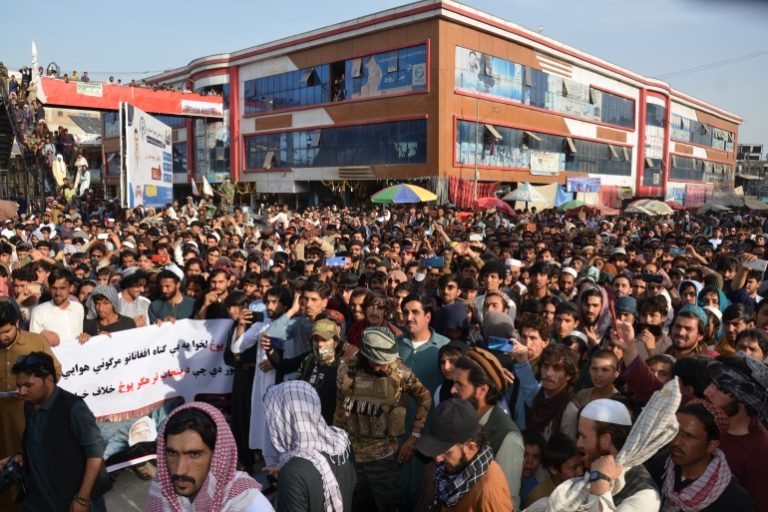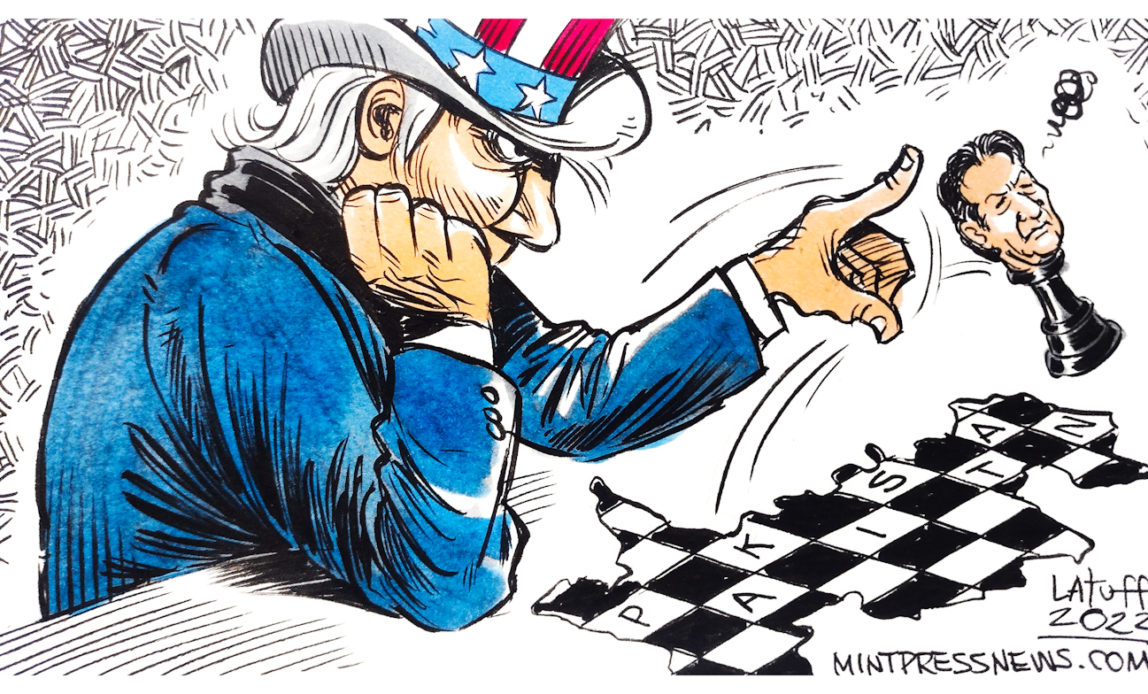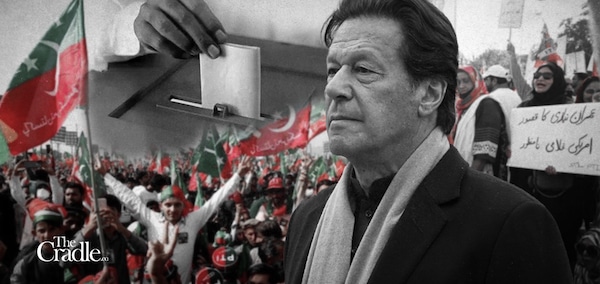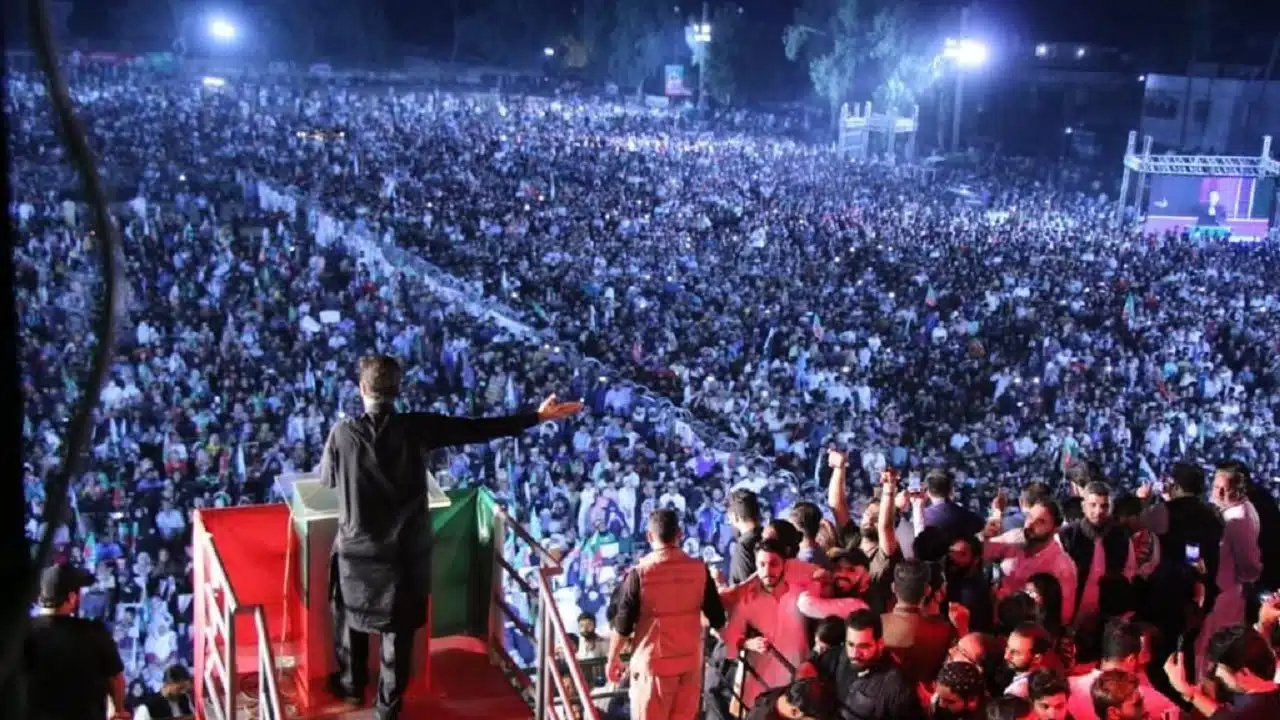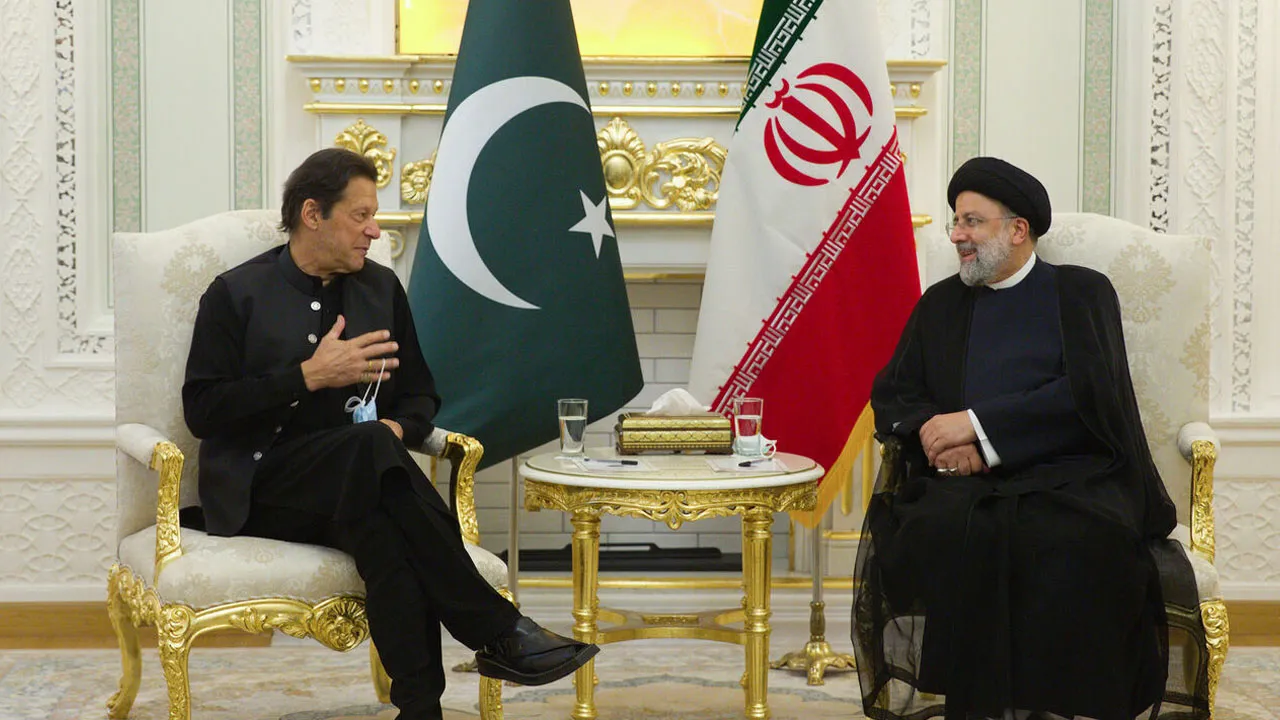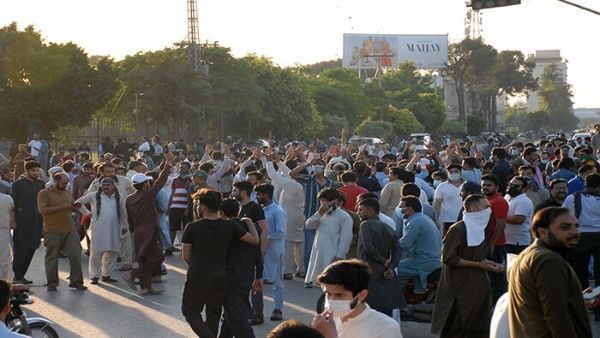__________________________________
Pakistan in the midst of a full-blown constitutional crisis
Pakistan’s Supreme Court is hearing arguments on the constitutionality of Sunday’s incidents at the National Assembly. A no-trust vote against the Imran Khan government was dismissed on account of it being part of a ‘foreign conspiracy’
April 04, 2022 by Peoples Dispatch
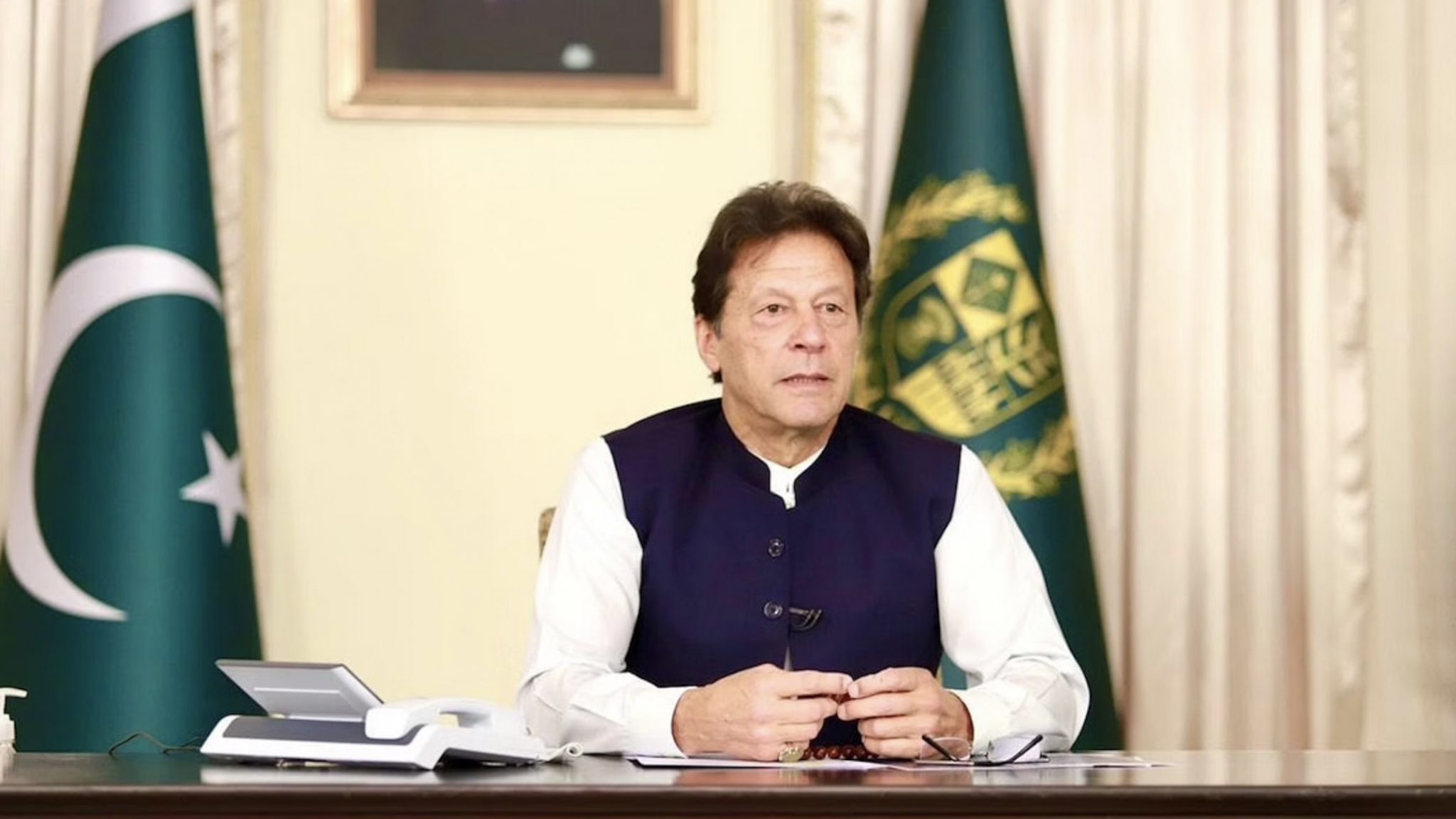
Pakistan is in the middle of a full-blown constitutional crisis with each day bringing a fresh series of developments that increase the uncertainty surrounding the country’s future.
Monday April 4, was a day of dramatic developments. The Supreme Court began hearing arguments on the constitutionality of the events of the previous 24 hours and is likely to arrive at a decision on Tuesday. On Sunday, the country’s National Assembly had met to vote on a no-trust motion against prime minister Imran Khan. However, in a surprise move, deputy speaker of the assembly Qasim Khan Suri dismissed the motion. Suri ruled that the motion was in violation of Article 5 of the country’s constitution which states that “Loyalty to the State is the basic duty of every citizen.” Earlier, information minister Fawad Chaudhry claimed in the Assembly that the no-trust motion was part of a foreign conspiracy to overthrow the government and hence violated Article 5. The deputy speaker accepted the argument and dismissed the motion.
Shortly after, Khan appeared on national television and accused the opposition of attempting to force a regime change on behalf of external actors (referring to the US). He declared, “I have advised the President to dissolve the Parliament. By using the constitutional power we have stopped this foreign-conspiracy. In a democratic society, change should come through elections. People, not the foreign powers, can decide.” Soon, president Arif Alvi accepted the prime minister’s recommendation and dissolved the National Assembly. The president also announced that Imran Khan would continue as caretaker prime minister until an interim prime minister was appointed ahead of elections. The president wrote to the prime minister and leader of the opposition Shehbaz Sharif, seeking suggestions for a caretaker prime minister. In response, Imran Khan nominated former Chief Justice Gulzar Ahmad.
The question before the Supreme Court is whether it can intervene in the proceedings of parliament. The opposition has requested the court to declare the deputy speaker’s and president’s actions unconstitutional.
An escalating crisis
The current crisis marks the convergence of two developments – the no-trust motion moved by the united opposition and prime minister Imran Khan’s claim that a foreign power was behind these plans. The no-trust motion was expected to succeed as there had been defections from Khan’s Pakistan Tehreek-e-Insaf (PTI) party and some coalition members in the government, such as the Balochistan Awami Party (BAP), had switched sides. The government had been trying to postpone the no-confidence motion citing various grounds.
Opposition parties, including the Pakistan Democratic Movement (comprising the Pakistan Muslim League Nawaz (PML-N) and other parties) and the Pakistan People’s Party (PPP) have been insisting that the PTI-led government demonstrate its strength in the 342-member National Assembly. Notably, no democratically elected government has ever completed a full term since the creation of Pakistan in 1947. Opposition groups cited the inability of Khan’s government to address the economic grievances of the common people as the reason for the no-confidence vote. Rising inflation rates have led to increased prices of essential food items like edible oil, pulse, wheat and sugar. Pakistan was forced to approach the IMF which demanded strict conditions and austerity policies in return for providing money.
Meanwhile, at a public rally on March 27, Khan spoke about a “threatening letter” he allegedly received from a foreign power as proof of a “foreign conspiracy”. He later mentioned the US and on April 1, reports emerged that the government had summoned a senior US diplomat in Pakistan and lodged a protest against its alleged interference.
Opposition groups demanded verification of the letter, calling it fabricated. Those favoring the government have claimed that the information provided in the document can be independently authenticated.
Many opponents of Khan’s government including senior journalists, rights activists and political workers, have rejected the theory of foreign intervention in Pakistani affairs as a “concoction” to survive this political crisis.
However, these developments also come at a time when Imran Khan’s policies have moved away from the US. Significant differences have also emerged between him and the Pakistani military, a longstanding ally of the US and the most powerful institution in the country. According to critics, repeated disagreements between the military and the civilian government in Pakistan, ongoing for some time now, have become more apparent with the Ukraine war.
Khan was seen denouncing the joint letter issued by 22 European countries urging Pakistan to support a resolution in the United Nations General Assembly condemning Russia’s aggression against Ukraine. He declared at a public rally: “Are we slaves and do whatever you tell us… We are neutral in this conflict and will support those who want to end the war in Ukraine.”
Meanwhile, army chief Qamar Bajwa harshly condemned the Russian attack on Ukraine.
In a Facebook post, Taimur Rahman, general secretary of the Mazdoor Kisan Party [Workers and Peasants’ Party], noted that while parties accuse each other of treachery and of being foreign funded, this is an accusation that needs to be proved in court with evidence. He concluded that in the absence of the accusation being proved, the dismissal of the no-trust motion was unconstitutional. He added that if fresh elections were held, the chances of the PTI returning to power were not bright due to its differences with the military establishment and its failures on the economic front, as well as its inability to fulfill its promises.
Rahman said that if the military establishment chose to remain relatively neutral in the upcoming elections, many politicians associated with the establishment could side with the opposition, which would adversely affect the ruling PTI.
Tuesday will prove a vital day for Pakistan as the Supreme Court’s decision could determine what happens in the coming weeks and months.
https://peoplesdispatch.org/2022/04/04/ ... al-crisis/
*******************************
US Ousts Imran Khan But His Revolutionary Narrative Endures
Posted by INTERNATIONALIST 360° on APRIL 5, 2022
MK Bhadrakumar

The US may control a handful of Pakistani political and military officials, but PM Imran Khan owns the street.
Washington has reactivated old cronies in Islamabad to unseat PM Imran Khan, but the latter has sown seeds of immense dissatisfaction with the old guard and their US backers within the Pakistani public. And Khan’s domestic and foreign allies will not sit by idly either.
Last Wednesday, during a meeting with Pakistan’s Foreign Minister Shah Mahmood Qureshi in the Tunxi city of eastern China’s Anhui province, China’s State Councilor and Foreign Minister Wang Yi made the thoughtful remark that there was a need to “to guard against the negative spillover effects of the Ukraine crisis” in the Asian region:
“We can’t allow the Cold War mentality to return to the Asian region. It’s impossible to allow a repeat of camp confrontation in Asia. We mustn’t allow turning medium and small states in the region into an instrument or even a victim of the games of big powers. The Chinese side intends to move in the same direction along with Pakistan and neighbouring countries, play a constructive role in ensuring regional and global peace and make its contribution to Asia.”
Curiously, as it turned out, that was also Qureshi’s last tour abroad as Pakistan’s top diplomat. No sooner than he came back home, his government fell, engulfed in a murky situation of precisely the kind that Wang Yi warned against.
Did Wang Yi have a premonition? We may never know but it is inconceivable that he was unaware of the tensions in Pakistan’s domestic politics fueled from outside, which led to the regime change last weekend.
From all accounts, the coup attempt in Pakistan unfolded as per an Anglo-American script. Prime Minister Imran Khan claimed to have documentary evidence to show that the senior-most official in the US state department dealing with the region, Assistant Secretary of State for South and Central Asian Affairs Donald Lu, had sent to him a threatening message via the Pakistani ambassador in Washington that his time was up in Islamabad as prime minister.
Imran Khan also alleged that the US embassy in Islamabad had been fraternizing with local politicians who subsequently defected from his coalition government. Washington has been vaguely dismissive about the allegations.
According to Khan, it was his official visit to Moscow in February, which coincided with the launch of Russia’s special operation in Ukraine, that provoked Washington the most – apart from his independent foreign policies and stubborn refusal to set up US military bases in Pakistan.
On Saturday, against the backdrop of the tumultuous political developments in Pakistan, the powerful army chief General Qamar Javed Bajwa waded into an unusual topic — Russia. He openly criticized Russia for its special operation in Ukraine, calling it a “great tragedy” that had killed thousands and made millions refugees and “half of Ukraine destroyed,” demanding that it must be “stopped immediately.”
He noted that Pakistan had enjoyed excellent defence and economic relationships with Ukraine since its independence but relations with Russia were “cold” for a long time because of numerous reasons, and that Pakistan had sent humanitarian assistance to Ukraine via Pakistan Air Force planes and would continue to do so.
Significantly, Bajwa also stated that “we share a long and excellent strategic relationship with the US,” and that Pakistan sought to broaden and expand relations with both China and the US “without impacting our relations with [either].”
Without doubt, the powerful general spoke with an eye on Washington, acutely conscious of the political transition in his country and taking care to place himself on the ‘right side of history.’
Bajwa’s message to Washington was three-fold: one, he didn’t share Imran Khan’s enthusiasm for close ties with Russia; two, nor did he share Imran Khan’s ‘anti-American’ foreign policies; and, three, he wouldn’t allow Pakistan’s alliance with China to overshadow his desire to deepen relations with the US.
Make no mistake, Pakistani generals are first and last seasoned politicians. That is why both China and Russia are acutely conscious of the geopolitical significance of the regime change event in Islamabad. Wang Yi’s prescient remarks find their echo in a report by the influential Russian daily Kommersant on Monday, based on expert opinion in Moscow:
“The dynamics of the current crisis indicate that Pakistan is at the threshold of a power change which may nullify many agreements with Moscow, considering that the new regime in Pakistan which will form in the next few months will be much more pro-American.”
According to the Director of the analytical center at the Moscow-based Russian Society of Political Scientists Andrey Serenko, “A special concern is caused by the fact that… Bajwa openly supported Russia’s adversaries. The drift of military-political heavyweights in Pakistan towards the US may have much more negative consequences for it [Russia] in the Central Asian region bordering Afghanistan. Belligerent and extremist elements in the Taliban, which are traditionally controlled by Pakistan’s special services, as well as the terrorist groups of the Islamic State and Jamaat Ansarullah have not lost interest in spreading jihad beyond Afghan borders.”
Equally, a member of the faculty of the Russian Foreign Ministry’s Diplomatic Academy, Vadim Kozyulin, had this explicit warning to give: “Washington putting pressure on the Pakistani government inevitably leads to the complication of the security situation in the Central Asian region and the emergence of new risks for the CSTO countries.”
Succinctly put, Russian experts anticipate a reversal of Imran Khan’s friendly policies seeking Eurasian integration. China too will be apprehensive that one of the US’s top priorities is to undermine the Belt and Road Initiative (BRI), of which Pakistan is a major hub. Certainly, the US will not want Islamabad to be a facilitator for the expansion of Chinese influence in Afghanistan. During a recent visit to Kabul, Wang Yi had proposed to the leadership of the Taliban Interim government the extension of the China-Pakistani Economic Corridor (CPEC), the flagship of the BRI, to Afghanistan.
From Iran’s perspective too, any surge in the US presence in Pakistan would have serious security implications, especially if US bases were to reopen. The negotiations in Vienna for the revival of the JCPOA are yet to come to fruition, and in any case, even with the lifting of US sanctions, Washington’s containment strategy against Iran is expected to continue in some newer form. The agenda of the recent conclave of the top Abraham Accords signatories, Egypt and the US [(hosted by Israel), was to build up a coordinated approach to countering Iran’s regional policies.
Pakistan has a history of aligning with the US’ Persian Gulf allies in their rivalry with Iran. Imran Khan deviated from that path and genuinely sought rapprochement with Tehran. To be sure, Washington will encourage the new regime in Islamabad to revert to the default position.
The broader US objective will be to roll back the Chinese presence in the Persian Gulf region. Thus, for a variety of reasons, while in the US strategic calculus, Pakistan always remained an important player, in the current context of global realignment, this becomes a pivotal relationship. The Pakistani military has an impeccable record of subserving American regional interests — and, it does have a rare capability and ‘expertise’ to do so — which no Muslim country is willing to perform in the current circumstances.
The US may be able to count on the Pakistani generals to ensure that Imran Khan does not ever again return to power. But the paradox is that his electrifying narrative — against corruption, for social justice and inclusion, Islamism and ‘anti-Americanism’ — has struck deep roots in Pakistani soil and will be difficult to vanquish. The main opposition parties stand hopelessly discredited in the public perception, given their track record of corruption and cronyism in office.
So, the big question is: Who will garner Imran Khan’s revolutionary rhetoric? A prolonged period of political turmoil can be expected. Now, in such a scenario, the role of the military becomes extremely crucial. The military leadership’s future intentions remain unclear. Traditionally, Pakistani military leaderships have been pro-US, and for its part, Washington always regarded the General Headquarters (GHQ) in Rawalpindi as its number one interlocutor.
The military denies involvement in civilian politics but the generals have in the past never hesitated to take advantage of political chaos to assume power. Of course, US backing for such a dispensation is indispensable and that is where Bajwa’s olive branch to Washington sets the agenda for politicking.
https://libya360.wordpress.com/2022/04/ ... e-endures/
*************************************************
Commentary: Regime change in Pakistan
Commentary by Rick Majumdar | April 11, 2022
On April 10, in Islamabad, Pakistan the Supreme Court upheld a vote of no confidence to remove Imran Khan of the Tehreek-e-Insaf (PTI) from power. The opposition parties, including the Pakistan Muslim League Nawaz (PMLN) and the Pakistan People’s Party (PPP) voted in favor of no confidence. 174 votes were in favor for no confidence, two more than 172 vote mark that needed for this to be passed.
Previously, on March 1, the heads of 22 diplomatic missions, including those of EU member states, released a joint letter urging Pakistan to support a resolution in the United Nations General Assembly condemning Russia's intervention in the Ukraine.
Following this, on March 4, Pakistan became the first country to officially sign a huge trade deal with Russia at a time when Moscow has come under severe criticism. As part of the agreement, Pakistan would import 2 million tons of wheat as well as natural gas from Russia, a deal worth several billion rubles.
At a rally on March 6, Imran Khan said, "What do you think of us? Are we your slaves?” in response to the critiques of Pakistan starting its trade in wheat and natural gas with Russia and not condemning the country because of the intervention in Ukraine.
At a rally on March 27, Khan spoke of an official communiqué sent by the U.S. that threatened his position. Khan would then contact and summon U.S. diplomat Donald Lu (Assistant Secretary of State for the South and Central Asian Affairs), the author of threat letter to Pakistan.
Imran Khan dissolved the National Assembly of the parliament in the face a no-confidence motion, citing that there was foreign interference within Pakistan's politics. This would be met with intense support for Khan with chants inside the parliament such as “Amrika ka Jo yaar wo hain gaddar” (the friends of America are traitors).
The Supreme Court of Pakistan however reinstated the ruling on Thursday, April 7 ,stating that dissolution of the parliament was illegal and proceeded to restore the National Assembly. Khan was removed from office on April 10.
During Khan's tenure ties with China improved and the CPEC (China Pakistan Economic Corridor), a project worth $62 billion, was established. This would rapidly upgrade Pakistan's required infrastructure and strengthen its economy by the construction of modern transportation networks, numerous energy projects, and special economic zones. This was a welcome and marked change in Pakistan from the IMF-led debt entrapment that the country was so used to, and which devastated the country's economic landscape.
These close ties with China and Russia came to the attention of the Western countries, especially the United States. It can be believed in no uncertain terms that this was a regime change effort by the U.S. that ultimately removed Imran Khan from office.
http://www.fightbacknews.org/2022/4/11/ ... e-pakistan
**************************
Massive Pro-Khan Rallies Sweep Pakistan On Eve of New PM Vote
Posted by INTERNATIONALIST 360° on APRIL 11, 2022
The Cradle

As the Pakistani parliament gears up to elect a new prime minister to replace the freshly ousted Imran Khan, massive protests swept the nation with thousands rallying in favor of Khan and against what many have called a foreign conspiracy spearheaded by the US.
Multiple cities erupted in protests on the night of 10 April in support of the ousted PM and the Pakistan Tehreek-e-Insaf (PTI) political party, including in Islamabad, Peshawar, Khyber Pakhtunkhwa, Karachi, and Lahore.
“In a democratic system the final voice will be the voice of the people. And the voice is the people is Imran Khan,” Ambareen Turk, a local PTI activist told Reuters from the protest in Islamabad.
Pakistani expats living in West Asia also joined in on the protests, with rallies taking place in Dubai.
The parliament will meet on 11 April to elect a new prime minister.
The leading opposition figure is Shehbaz Sharif, the younger brother of former prime minister Nawaz Sharif, who had been jailed on corruption charges.
Khan’s PTI, meanwhile, has nominated Shah Mahmood Qureshi, the former foreign minister of Pakistan, for the post. PTI threatens to resign from the parliament en masse if Qureshi loses.
A massive resignation such as that would likely lead to new elections.
Only a few minutes after midnight on 10 April, the parliament of Pakistan held a no-confidence vote to oust Prime Minister Imran Khan. The vote was held successfully, with the majority of MPs in favor of ousting Khan from office.
Khan has accused the opposition of conspiring with “foreign powers” to remove him from office because he would not comply with western demands to stand against Russia and China.
Pressure on Khan started after 6 March, when he made headlines for criticizing western powers for pressuring Islamabad into condemning Russia’s military actions in Ukraine.
“What do you think of us? Are we your slaves … that whatever you say, we will do?” Khan said at a political rally.
https://libya360.wordpress.com/2022/04/ ... w-pm-vote/
